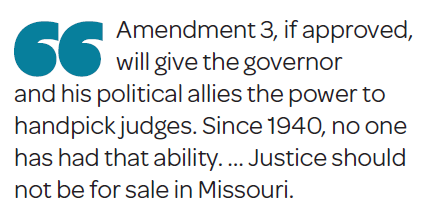Justice is Not for Sale


THE NONPARTISAN Court Plan has been working for Missourians for 72 years by taking politics out of the courts and focusing on the qualifications and experience of judges. Our system has worked so well that more than 30 other states have copied it in whole or in part. But a few politicians and their financial supporters believe that our courts should become more political. In a few weeks, we will vote on whether we want our judiciary to become as political as the other two branches of government. Amendment 3, if approved in a statewide vote this fall, will give the governor and his political allies the power to handpick judges. Since 1940, no one has had that ability, and for good reason: justice should not be for sale in Missouri.
But you will hear a few talking points by those who would politicize our judiciary: 1. Amendment 3 is a modest change to the Non Partisan Court Plan; and 2. we need to wrestle control of our judges away from liberal trial lawyers. There is no truth to either claim.
Behind the current system
In our current system, when there is a vacancy on the appellate bench, judicial candidates are screened by the Appellate Judicial Commission, which selects and sends the top three candidates on to the governor, who then makes the appointment. The AJC has been largely insulated from political influence by the governor and his campaign contributors because of the way the AJC commissioners are selected. Every two years, the members of the Missouri Bar elect one attorney to the AJC, and the governor appoints one layperson. The seventh member is a Supreme Court judge picked by the Supreme Court. The AJC has been a balanced team of lawyers, laypeople and judges; no group has been able to exert dominion over it.
Since 1940, when Missouri voters adopted the Non Partisan Court Plan, 17 governors have held office. Only one governor has appointed as many as three AJC commissioners who have together participated in selecting an appellate judge: Gov. John Ashcroft. Because there are seven AJC commissioners, no governor has ever appointed a majority. Giving the governor nominal power over the AJC was intentional in 1940 because judicial selection was intended to be non-partisan and shielded from the corrupting influence of money and politics.
Amendment 3 would dramatically affect how we select our appellate judges. Amendment 3 makes the judge a non-voting member, and it gives the governor four appointments to the AJC on Jan. 15, 2013, so the new governor will appoint a majority of commissioners as soon as he takes office. All future governors will get to appoint four AJC commissioners within two years of taking office. In other words, every single future governor will be able to handpick a majority of AJC commissioners, and nothing prevents the governor from telling his or her appointees how to do their job. The AJC could become a group of “yes men” to the governor.
Balance of the AJC
Our current system has worked well for 72 years by giving us fair and impartial judges. We have had no corruption and no scandal in our judiciary. The makeup of the AJC has much to do with our success because it has been balanced and insulated from abuse. The three attorney members are elected from the attorneys who practice in the three appellate districts, and the election is non-partisan. Historically, Missouri lawyers have elected the best and brightest among them to the AJC. One attorney is a former president of the Missouri Bar, and another is a highly respected defense lawyer. Typically, the lay commissioners represent both political parties. Right now, there are two Republican appointees and one Democratic appointee, even though Gov. Jay Nixon is in his fourth year of office. The current judge on the AJC has served on the appellate bench since 1998. The balance of the AJC is one of its great strengths.

If it were true that “liberal trial lawyers” control judicial selection, then one would expect the defense bar to favor Amendment 3, but it does not. The chambers of commerce in Columbia, Springfield, Kansas City, Blue Springs and Lee’s Summit have all voted to oppose Amendment 3. Shelter Insurance Co. and Commerce Bankshares of Kansas City recently made sizeable contributions to oppose Amendment 3. Business groups oppose this misguided effort to politicize our judiciary because we all benefit from stability in our courts, and none of us gains from giving the governor domination over the AJC and, ultimately, our courts.
Judges are supposed to be honest and impartial and decide cases based on the law and the facts of the case. Since 1940, we have enjoyed a judicial selection system that maximizes the likelihood that only fair and impartial judges will serve in our highest courts. Our selection system focuses on talent and intelligence and judicial temperament, not ideology or politics, and no one has the ability to buy his or her way into the room where judicial candidates are screened. Amendment 3 would end merit selection in Missouri by giving too much power to the governor and his or her campaign contributors. Vote no on Amendment 3.


